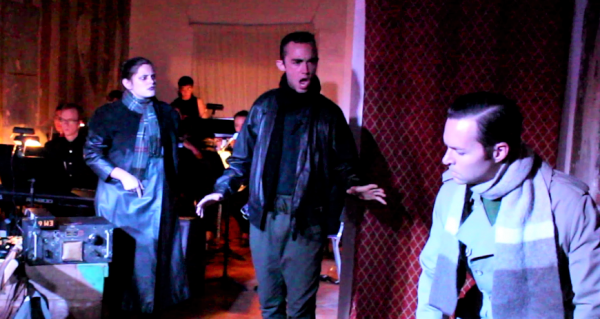
Greenland. Music by Evan Kassof, libretto by Aleksandar Hut-Kono. American premiere as part of The Propaganda Machine Show, Philadelphia, September 2018.
Greenland is an opera about the making of propaganda during the 20th century. It had its world premiere in London in 2015 at the Barbican Centre and the studio theater of the Royal Opera House, Covent Garden, and received its American premiere in an independent production during the September 2018 Philadelphia Fringe Festival called The Propaganda Machine Show.
In Philadelphia, Greenland was paired, appropriately, with a restored version of Refuge, a film completed in 1939 by the Spanish Refugee Relief Campaign. Each focuses on the meaning and making of propaganda. That word is derived from the Latin propogandus, meaning “to propagate” and was established by Pope Gregory XV in 1622 as a means of furthering Catholic missionary activity. The word gained notoriety when it was used by the Nazi government in the 1930s.
Refuge was a tool used by the other side; a movie made by an organization that raised funds for Spanish exiles during the Civil War when Generalissimo Franco, aided by Germany and Italy, overthrew the Republican government of Spain. For that purpose, the committee exhibited Picasso’s painting Guernica on a tour of the United States. Picasso supported the use of his work in a fundraising strategy to help the Spanish people, and the impact was so great that it became a symbol against violence towards civilians.
The film uses newsreels to depict the plight of Spanish refugees, some of it taken from a camera hidden in a grocery bag by director Jean-Paul Le Chanois. This presentation of Refuge has a live score by Joshua Hartman. It’s poignant in a time where our world has so many refugees seeking entry into different countries, confined in camps such as we see in this film.
Greenland’s libretto is by the Croatian Aleksandar Hut-Kono and music by the youthful American composer Evan Kassof. The opera presents a film director resembling the Nazi propagandist Leni Riefenstahl, who is in Greenland in 1940 with her stuntman and her cameraman. They are shooting a propaganda film to pave the way for a Nazi occupation of that nation. The characters become trapped on the ice and fight with each other over surrendering to U.S. forces or waiting for German help. Greenland’s characters weigh the tension between making art and making propaganda.
The individuals are depicted as people who sincerely believe in the superiority of Germans. They sing about “people with no culture, Yankee scum,” and say “I’d rather freeze to death than lick filthy Yankee boots.”
It may be considered a chamber opera because of the small number of orchestral players and characters. But Greenland’s emotions are large-scale and so is the passion in Kassof’s music. The style is post-verismo, tonal and dramatic, and the climax recalls Puccini’s Tosca. Tenor Wesley Morgan and bass Anthony Sharp are excellent in the male roles while Anaïs Naharro-Murphy is stunning as the film director. I look forward to seeing her in other roles from lyric to dramatic.
The six-person orchestra, for the film and the opera, was convincingly led by Kassof. Direction was by Nicole Renna. Kassof, Renna and Naharro-Murphy are the founding members of ENAensemble which creates music theater with points of view.
The opera was followed by a contemporary cabaret. Its vocal trio was entertaining, but I wish they had performed songs that had some connection with World War II propaganda, such as “Praise the Lord and Pass the Ammunition” or “He’s 1A in the Army and A1 in My Heart.” There are so many examples of that genre.
This review was originally published on the international website The Opera Critic.